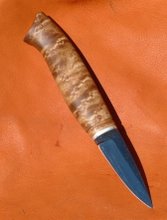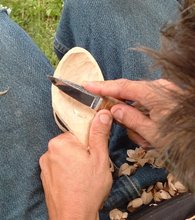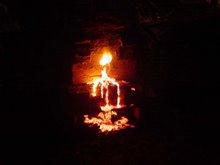Or "Rythym", I more commonly call it.
It's important, it's the underlying component of many of the things I do. It's important for efficiency and accuracy, and for a pace that's sustainable.
One of the standard anecdotes, in various forms, goes something like;
There are two men in the smithy, a young man, and the Old Master. Both are forging, the young man hammers away quickly, almost desperately, with a hurried pace and always an eye on keeping up with the Old Man.
The old man, brings down the hammer almost slowly, but always at the same tempo, always hard, and sure, and in place.
At the end of the day, the young man is tired, and his pile of goods is smaller than the Old Man's, and even still, some of the goods are not made as well as they could be.
He's convinced the Old Man knows some trick or secret of the method he's not sharing, and his ego makes him resentful.
The young man sees his hammering and his work as a single large element that encompasses the entire day, and measures it that way, simply by how much he's made.
The Old Man, measures each single blow, one at a time. Each strike of the hammer is a single action and the effort, and his mind, is focused on that one moment. Every blow is powerful, accurate, and complete. Every blow is efficient, and propelled by a tempo that The Old man knows, from expierience, will serve him the whole day without getting tired, without the last of his blows being less than the first. One sure, measured blow, surpasses 10 of the unmeasured ones.
And so it is with many things in the shop really. Like draw-filing the faces of a sword-blade flat, for instance. It's a huge undertaking, and depending on just how flat you want it to be, how accurate you want it to turn out, it can be a challenging technical exercise also. The file doesn't just do it's work by its-self, it has to be guided in it's task. To do accurate work with hand tools is really all about "playing the averages". To wail away with the file in one spot without an eye to the whole, just makes a depression in that one spot, and it won't relate, or blend in with, the next spot. Tempo is what can overcome that. Solid, steady, purposeful strokes, one after the other, each one the same as the last, with also a movement down the blade in each stroke, the same distance of off-set each time, is almost easy with tempo. If your tempo is sure, if you let yourself really go deeply into the tempo, then amazing things can take place with the file, flatness and straightness that rival what machines produce can be had with the human machine very often.
It also makes it possible to accomplish extremely large sections of work that otherwise seem impossibly huge. The tempo brings a steady efficiency that'll help you get through a large work.
Many times, it's very much like making music with the tools. Again, drawfiling steel, that has a distinct sound, and it can say alot as you work. The tempo turns it into work that involves all the senses at once, you see it, you feel it in your hands, but you can hear it too, and it connects you to the tool, and the work, very closely. Ultimately, when the day is truly going good, you disappear into it, you get lost in the tempo, and the sound, the feel, and that's all there is, and that's when some truly amazing work can take place.
I've started to be convinced that everybody has an internal tempo, a rythym inside, that can be tuned-into. Bicylists and runners know what I'm talking about. It propels them to distances and speeds, and over obstacles that would otherwise be impossible to defeat, just by wailing away at it without order, structure, and tempo. You can perform the whole by making each moment, each beat of the tempo, individually perfect. The tempo is the framework that allows it to happen in succession. It allows the mind to be free of complicated words and thoughts about each stroke, or step, or movement, but at the same time makes each movement it's own.
Sometimes it's a shock, a suprise, when you reach the end of the task. That's how I know my tempo was a good one that day.
Monday, January 29, 2007
Subscribe to:
Post Comments (Atom)








No comments:
Post a Comment